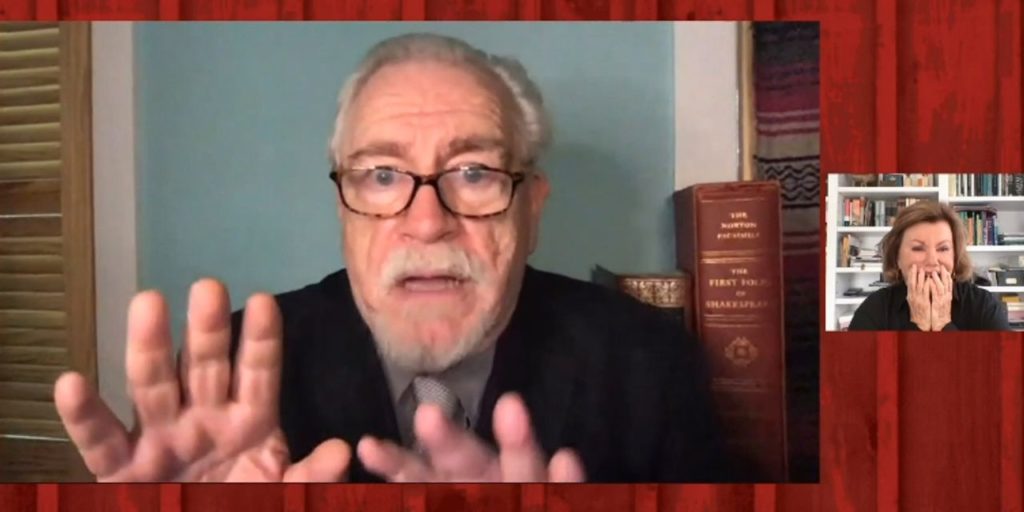
Sarah Vaughan sings “Just One of Those Things” and “Eternally” on a 1960 episode of Perry Como’s Kraft Music Hall:
(This is the latest in a series of arts- and history-related videos that appear in this space each Monday, Wednesday, and Friday)
Terry Teachout on the arts in New York City

Sarah Vaughan sings “Just One of Those Things” and “Eternally” on a 1960 episode of Perry Como’s Kraft Music Hall:
(This is the latest in a series of arts- and history-related videos that appear in this space each Monday, Wednesday, and Friday)
“To be able to know and still say nothing often seems to me the most creditable of human accomplishments.”
James Gould Cozzens, By Love Possessed
* * *

Two-character epistolary plays are well suited to the restrictive requirements of Zoom webcasting during the pandemic. Hence I admit to being surprised that it took so long for someone to revive “Dear Liar,” the 1957 play that Jerome Kilty chiseled out of the correspondence of George Bernard Shaw and Mrs. Patrick Campbell, the Vicwardian actress who inscribed her name in posterity’s books by creating the role of Eliza Doolittle in Shaw’s “Pygmalion” at the improbable age of 49. Fortunately, Pennsylvania’s Bucks County Playhouse, one of my favorite regional companies, has obliged with a very satisfying benefit reading of “Dear Liar” directed by Mark Brokaw and starring Marsha Mason and Brian Cox.
“Dear Liar” tells the tale of the elaborate, at times elephantine flirtation-on-paper between Mrs. Pat (as she was known) and Shaw, an emotionally stunted husband who developed a near-incapacitating crush on his Eliza but was notorious for talking about love in preference to making it….
Florida Repertory Theatre, which webcast a superior production of Lucas Hnath’s “A Doll’s House, Part 2” back in April, is now streaming a delightful modern-dress version of “Twelfth Night” that is performed on the simplest of sets by six of the company’s non-Equity acting interns. Intended to be performed in local high schools as part of the company’s “Theatre for Young Audiences” program, this hour-long staging, adapted and directed by Bill Kincaid, was taped just before the pandemic shut Florida Rep down….
I can’t imagine a better introduction to Shakespearean comedy for adolescent audiences…
* * *
Read the whole thing here.Mrs. Patrick Campbell talks about “The Art of Acting and Beautiful Speech” in a rare 1929 film clip:
In my latest Wall Street Journal “Sightings” column, I discuss the many film scores that Bernard Herrmann wrote for directors other than Alfred Hitchcock. Here’s an excerpt.
* * *

Bernard Herrmann is by common consent the greatest of all film composers—but one whose name is firmly attached to the work of a single director. Between 1955 and 1964, he scored seven films for Alfred Hitchcock, and it is those scores for which he is best known, in part because most of the films that they accompany are now regarded as cinematic masterpieces….
Yet Herrmann, proud though he was of his collaboration with Hitchcock, was quick to point out that there was more to him than “North by Northwest,” “Psycho” and “Vertigo.” He scored 40 feature films for other directors, including such masters of the art as Joseph L. Mankiewicz, Nicholas Ray, Martin Scorsese, François Truffaut, Robert Wise, Orson Welles and Fred Zinnemann, working on every kind of movie from science fiction to widescreen westerns. He also wrote music for hundreds of radio and TV shows, most notably Welles’s notorious radio version of “The War of the Worlds” and Rod Serling’s “Walking Distance,” the most moving of all “Twilight Zone” episodes. Nor did Herrmann save his best for Hitch…
* * *
Read the whole thing here.Bernard Herrmann records a cue from his score for François Truffaut’s Fahrenheit 451:

A new episode of Three on the Aisle, the podcast in which Peter Marks, Elisabeth Vincentelli, and I talk about theater in America, is now available on line for listening or downloading.
Here’s American Theatre’s “official” summary of the proceedings:
To listen to or download this episode, read more about it, or subscribe to Three on the Aisle, go here.This week, we talk to Brooke Ishibashi, Carson Elrod, and Jenny Makholm, co-organizers of Be An Arts Hero, an “intersectional grassroots campaign” pushing the Senate to allocate proportionate relief to the arts and culture sector of the American economy. We discuss the enormous economic importance of arts and culture in the U.S., the staggering number and variety of jobs in every state that comprise this sector, and the catastrophic cost of the absence of immediate government relief specifically earmarked for the arts.
In case you’ve missed any previous episodes, you’ll find them all here.
Eddie “Rochester” Anderson appears as the mystery guest on What’s My Line? John Daly is the host and the panelists are Hal Block, Bennett Cerf, Arlene Francis, and Dorothy Kilgallen. This episode was originally telecast by CBS on November 23, 1952:
(This is the latest in a series of arts- and history-related videos that appear in this space each Monday, Wednesday, and Friday)
“Everybody makes fun of virtue, which by now has, as its primary meaning, an affection of prudery practiced by hypocrites and the impotent.”
Thomas Merton, The Seven Storey Mountain
“Men imagine that they communicate their virtue or vice only by overt actions, and do not see that virtue or vice emit a breath every moment.”
Ralph Waldo Emerson, “Self-Reliance”
An ArtsJournal Blog